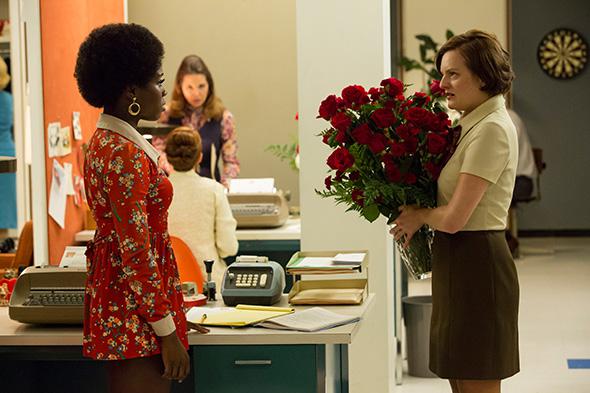Willa, Julia,
Well, Julia, since you asked: As a freelancer, I’ll admit that opening sequence hit a smidge close to home. Set the alarm bright and early, brimming with ambition for the day; fail to exit bed until noon; get tipsy while watching daytime TV; suddenly realize at 8 p.m. that you haven’t showered and you’re still in your bathrobe and you really ought to show a marginally less pathetic face to the outside world. (I’m not saying that’s my average Thursday. I’m also not saying it’s out of the realm of possibility.) To his credit, Don is keeping close tabs both on that bottle of Canadian Club and on SC&P’s internal politics. He may be living in filth and running out of Sweet’N Low, but he hasn’t yet relinquished hope.
Having been treated to an update on Don’s daily grind, we then transition to the meat of the episode. “A Day’s Work” turned out to be Mad Men’s take on the classic office sitcom—an elevated version of The Mary Tyler Moore Show. We’ve got speakerphone shenanigans, boffing on desktops, wacky misunderstandings, even a grumpy boss named Lou. That conference call was a comedic tour de force, with Roger apologizing for every ribald aside and Bert slamming Pete with one of his signature burns: “Is this a partners’ meeting or the most tedious wireless program I’ve ever heard?”
You both picked up on the episode’s portrayal of the roller-coaster ride the late ’60s became for professional women. That idea was encapsulated by the verbal exchange as Peggy mooned over those roses. Stan: “Look at you, every inch a girl.” Peggy: “Is this some kind of joke? Because I don’t want to have to fire you later.”
But I’d argue that for the first time in the show’s run, race was the most prominent period theme of an episode. Consider: 1) Peggy steals Shirley’s flowers out of total obliviousness to the fact that Shirley is a person who has a life outside of serving Peggy. 2) Peggy gives the flowers back to Shirley, all the while congratulating herself on the beneficence of this regifting. 3) Peggy gets angry at Shirley for having the temerity to receive any flowers at all. 4) Peggy attempts to demote Shirley out of a roiling rage that stems from … well, Peggy’s not sure, she just knows Shirley’s upset her somehow. The whole sequence seems like a pretty solid metaphor for midcentury American racial relations.
In general, self-absorption was the order of the day. Valentine’s Day, no less. Lou repeatedly declares, “It’s not my problem,” and when Sally shows up, confused and lost, he can only interpret it as a personal affront. Peggy can’t see past her own hang-ups. (Ginsberg jokes that Peggy’s calendar entry for the day reads “masturbate gloomily,” but that’s sort of what she did—jerking everyone around as she acts out a morose drama that lives only in her head.) Pete wants Bonnie to sacrifice a sale so she can pleasure him in a hotel bungalow. (Is “I want to chew you up and spit you out” the least sexy Valentine pickup line that’s ever crossed a man’s lips? Leave it to Pete to woo a woman with the threat of mastication and abandonment.)
At least there was a little affection—though it came from the unlikeliest of places. I was almost touched by that elevator assignation between Jim Cutler and Roger Sterling. “I’d hate to think of you as an adversary,” says the delightfully devilish Jim. “I’d really hate that.” Roger’s butter isn’t melted, but it may have softened a little.
And of course the most traditional Valentine’s Day date was between Don and Sally. It starts with a lie, continues with conversation over dinner, and ends with one of the sweetest, most heartwarming moments that Matthew Weiner’s ever given us. As you note, Julia, it’s Don’s honesty that turns Sally around. Once he tells her he got in hot water for telling the truth, her whole posture changes. He becomes a figure of interest to her. She even hangs up on her chatty roommate so she can spend more time with dear old Dad. Don and Sally have always been the two characters on Mad Men who float above all others—strangely compelling to the people around them, prone to lie more out of reflex than maliciousness. I’d love to see their relationship develop more over the course of the season.
I’d also love for a few dramatic fireworks to explode, and soon. These first two episodes have been, as always, meticulously crafted, beautifully acted, and gorgeously art-directed. But they’ve also lacked a certain pizzazz. No Zou bisou bisous here. It’s all spinning wheels and setup, and no payoff, so far. Just five more episodes to go in this abbreviated half-season. Surely there’s a lawnmower or a noose looming on the horizon?
I didn’t know I was going to be interrogated by the Hooterville telephone operator,
Seth
Read all of Slate’s coverage of Mad Men.
